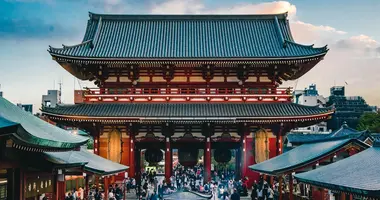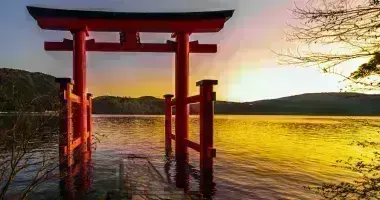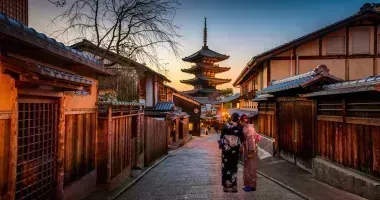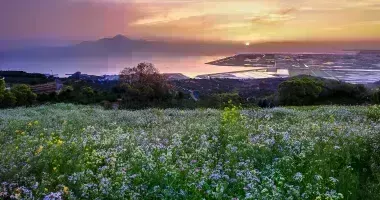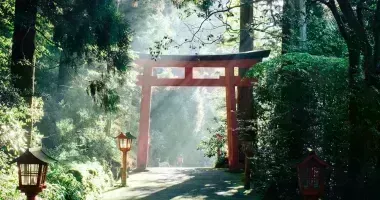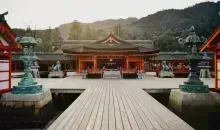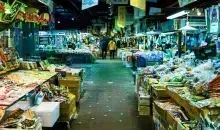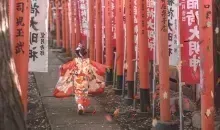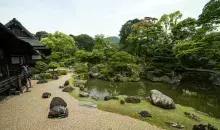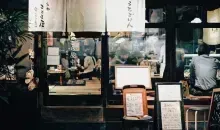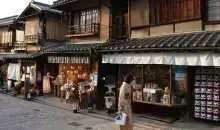Wakuwaku Winter Festival
Wakuwaku Winter Festival, held in February in Niigata Prefecture features digging snow caves, dondo-yaki, ball games, and making mochi.
Wakuwaku Winter Festival, Niigata ワクワク祭り
Greg Goodmacher
Wakuwaku is a Japanese phrase that means excitement and thrills. And Wakuwaku Farm, in Shibata, Niigata, stimulated visitors to feel excited and thrilled during the Wakuwaku Winter Festival on the weekend of February 7 and 8.
Festivities included digging snow caves, watching and hearing a crackling bonfire of bamboo and rice straw, playing ball games, drawing pictures, painting bamboo candle holders, petting and feeding a friendly nanny goat, pounding mochi, and eating traditional and regional foods. The winter festival also injects yen into the local economy and promotes homegrown agricultural products and art.
 Making mochi at Wakuwaku Winter Festival in Niigata Prefecture
Making mochi at Wakuwaku Winter Festival in Niigata Prefecture
Wakuwaku Farm
Mr. Chikui, Wakuwaku's manager, explained that the theme of Wakuwaku Farm is "hometown produced goods." A farmer dining on the brick-oven roasted pizza in the Italian restaurant has a good chance of eating the fruit of his own labor or of his neighbor's.
The milk for the gelato, which is some of the best in Japan, comes from a small dairy in the vicinity. Wakuwaku's farmer's market sells the same fruit and vegetables the restaurants cook with. Since transportation distances and times are short, the cucumbers, tomatoes, and so on ripen on the vine in greenhouses, before being picked. Thus, they arrive sweet and crunchy. Vegetables growing under snow are known for being especially sweet.
 Enjoying fresh mochi at Wakuwaku Winter Festival, Niigata Prefecture
Enjoying fresh mochi at Wakuwaku Winter Festival, Niigata Prefecture
Winter Events
Most winters, Niigata Prefecture is deluged with meters of snow, and the winter festival makes good use of that moldable water. One of the events was the digging and shaping of snow huts or snow caves, called kamakura in Japanese.
Making kamakura was a common activity generations ago, but for many of today's children who were visiting from modern-day Niigata City, it was their first taste of traditional winter customs, and those children were widely smiling while exploring the white snow caves.
The most popular and photographed event was the mochitsuki event. Glutinous rice is steamed, and it is then pounded with wooden mallets weighing several kilograms each. Volunteers beat the rice to the rhythm of a watching audience chanting yoiso, yoiso, yoiso. Adults and children take turns. Some children were smaller than the mallets, so adults aided them. Occasionally, to the amusement of the crowd, the two mallets would collide or hit the outside of the wooden mortar.
When the rice is as sticky as chewed gum and has the texture of rubber, it is ready to be eaten with a mixture of sweetened red beans. Eating mochi is a tradition during winter and especially at New Year. It is a dangerous custom, though. On January 5, the media reported that nine people had died from choking on the glutinous rice sweet during the New Year holiday.
 Fun and ball games at Wakuwaku Winter Festival, Niigata Prefecture
Fun and ball games at Wakuwaku Winter Festival, Niigata Prefecture Dondo-yaki, a bonfire of rice straw and bamboo
Dondo-yaki, a bonfire of rice straw and bamboo
Dondo-yaki
Another event, Dondo-yaki, a crackling, flaming, smoking tripod-shaped bonfire of rice straw and bamboo, both excited and scared young visitors: some hid and peered at the fire from behind their parents. When burning, fresh bamboo bursts with the sound of fireworks or a misfiring engine. Standing near the dondo-yaki is risky, and the fieriness of the heated air pushes at you like a burning wall.
Before being set aflame, the bonfire was decorated with local children's drawings of oni, Japanese demon-like creatures. Children also wrote short phrases describing what they wanted to avoid or hoped for in the next year. Some messages revealed that the kids hated spiders, colds, and selfishness.
People also placed last year's ofuda, which means a talisman for household protection, within the straw before the bonfire was lit. Some believe the spirit of the burned talisman returns to heaven and a new talisman must be purchased from a shrine for the coming year. The protective spirit apparently has a one-year lifespan.
After the bonfire's fierce heat had decreased to a safer temperature, a few people with long poles dangled dry squid from strings over the flames and embers (see the video below). The crispy winter air became redolent with the thick smell of heated squid. Chewing the warm dried squid requires strong jaws.
 Heating up dried squid over the bonfire
Heating up dried squid over the bonfire Shiitake mushrooms in Niigata Prefecture
Shiitake mushrooms in Niigata Prefecture
Shiitake
Close by where the bonfire was burning out and on the edge of a forest, a row of logs inoculated with shiitake fungi waited for their owners and hoped no sparks would drift on them.
Brown shiitake mushrooms ranging in size from a small coin to a small frisbee grew out of the logs. These logs belong to members of the "Shiitake Genboku Owner No Kai," which means shiitake log owners' club. Members cooperate and only harvest their own mushrooms. The group runs on community spirit, the honor principle, and, mushroom consumption.
Across a walking path from the mushroom logs, in a small shed is a gorgeous, pregnant white longhaired goat whose ten-inch hard horns made some visiting children nervous. But she is really a sweet girl, and she loves being gently stroked on the face.
This unnamed girl goat has neighbors, a small herd of rabbits. If you want, you can feed them some vegetables from the market. Although, you will not hear them say, "oishii," delicious in English, they will appreciate your kindness. After that, it might be time to get some hot food inside of you.
All weekend long, there was a one-meter wide cooking pot outside the front door of Tsukinooka, which is a shop selling traditional Japanese sweets and exhibiting artistic traditional wooden dolls.
Employees served bowls of hot stew made with local beef and daikon, carrot, onions, and konnyaku for the price of one hundred yen. To warm the hearts, hands, and stomachs of visitors who have been outside in the snow, a large bucket of amazake, a sweet rice drink was available for free inside Tsukinooka.
 Friendly Goat, Wakuwaku Winter Festival, Niigata Prefecture
Friendly Goat, Wakuwaku Winter Festival, Niigata Prefecture
Dolls
In keeping with the idea of promoting local products, the traditional hand-carved dolls in the exhibition section of Tsukinooka are works of art that were created by master doll makers in various areas of Niigata. These high-quality artworks are entirely crafted from wood and other natural materials. You admire the dolls while munching on sweets.
The various Japanese sweets, or wagashi, available within the shop are all made from local ingredients, too. Most are traditional sweets that Japanese have been eating for generations or centuries, but you can also buy Western sweets with a Japanese touch, such as green donuts made from rice and tea. The next step might be some more outdoor activities to burn off some calories.
Wakuwaku Farm is on a small hill above the hot spring village of Tsukioka Onsen, which is more than worth visiting after a meal at Wakuwaku. A several kilometer hiking trail takes visitors from Wakuwaku to ponds where wild herons, ducks, and wintering swans are often seen. An unplowed, curving road descending to Wakuwaku transforms into a thrilling sled course in winter.
Down in the valley below Wakuwaku, there are free foot and hand baths along walking paths and some hotels have lovely indoor baths and artistically designed interiors. There are two types of mineral water hot baths in the village. One is from an emerald green alkaline spring. The other is clear with a slight odor of sulfur.
 Wakuwaku Winter Festival food, Niigata Prefecture
Wakuwaku Winter Festival food, Niigata Prefecture
Access - Getting to Tsukioka Onsen, Niigata
Tsukioka Onsen is located in Niigata Prefecture, which is about two hours from Tokyo by the Bullet Train.
Getting to Tsukioka from Niigata city, requires a drive of around forty minutes. Buses from Tsukioka will collect visitors at local train stations, too. For more information, contact the tourism site of Tsukioka Onsen.
